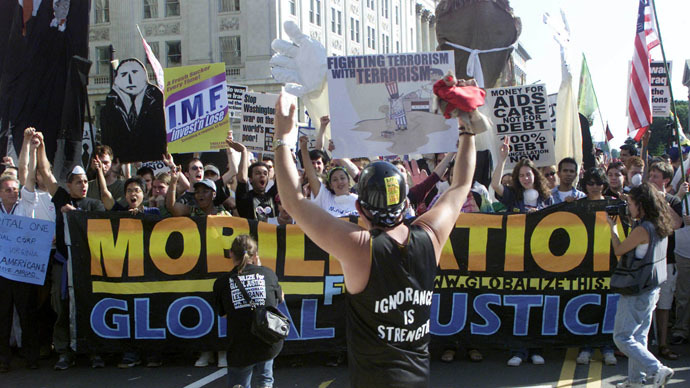Settlement over 2002 World Bank/IMF protests in DC imposes new police policies

Police will have to adopt new polices with regards to dealing with demonstrators in Washington, DC as a settlement comes close to being finalized in a case concerning 400 protesters unlawfully arrested during a 2002 rally protesting the World Bank.
US District Court Judge Emmet G. Sullivan has given his
preliminary approval to a settlement that would award more than $2.2
million to individuals detained during a World Bank/International
Monetary Fund protest more than a decade ago.
Judge Sullivan signed off on the proposed class action settlement
on May 10, but attorneys representing the few hundred plaintiffs
didn’t go public with his decision until Monday this week.
“Although many media pundits and politicians have suggested
that the social justice movement and the free speech and assembly
rights of protesters have to be constricted for the sake of
security and order, this settlement disproves that myth,”
said Mara Verheyden-Hilliard, the executive director of the
Partnership for Civil Justice Fund, which represented the
plaintiffs. “There is simply no basis by which any other
jurisdiction’s police department can legitimately claim it cannot
enact these procedural standards that conform to fundamental
constitutional requirements.”
BREAKING: $2.2 million settlement of mass arrest case + major reforms of Park Police handling of mass protests http://t.co/2sg8Nox7Mf
— PCJF JusticeOnline (@ThePCJF) May 18, 2015
The settlement stems from an event held nearly 13 years ago in
Pershing Park on the National Mall in Washington, DC in which
protesters gathered to rally against the World Bank and IMF. That
demonstration ended in mass arrests after the US Park Police
encircled the group and the city’s Metropolitan Police Department
took individuals into custody soon after.
Previous litigation rendered those arrests null and void, and the
newest ruling would provide compensation on top of the $8.25
million previously awarded to the protesters.
In addition to putting aside $2.2 million to compensate the
victims, the proposed settlement establishes new “best practices”
to be adopted by the US Park Police, which the PCJF calls
“significant and substantive reforms” with regards to
the agency’s policies and procedures in handling First Amendment
activities, as well as events where multiple police departments
may be involved.
Big news - unprecedented settlement with the PCJF & the US Park Police will reform agency's handling of mass protests http://t.co/2sg8NoOJaP
— PCJF JusticeOnline (@ThePCJF) May 18, 2015
“The parties believe that the changes the Park Police has
made and will make to its policies and procedures for handling
mass demonstrations and potential high volume arrests --
including in the context of inter-jurisdictional cooperation,
which context underlies this matter -- will avoid the
circumstances that occurred on September 27, 2002 from
recurring,” the agreement reads in part.
The stipulations included in the proposed settlement mandate that
police will henceforth be prohibited from encircling protesters
and are required to give fair notice before attempting to arrest
any protesters. To avoid situations like the one in 2002, before
actually attempting to take any individuals into custody, Park
Police will now have to give three orders at two-minute intervals
warning protesters that they risk being arrested.
“All the recent protest movements — the anti-globalization,
anti-war, Occupy Wall Street and Black Lives Matter movements —
have faced unconstitutional mass arrests. The reforms in this
settlement take aim at the recurrent problem of police, without
proper warning and notice, suddenly rounding up, trapping and
arresting demonstration groups. If these reforms can be enacted
here in the nation's capital, they can and should be implemented
in cities across the nation,” added PCJF Legal Director Carl
Messineo in a statement.












